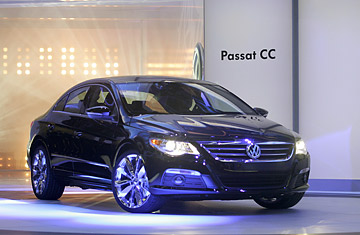
For years, one of the defining images of the African political élite has been the silhouette of a figure sitting behind tinted glass or drawn curtains in the backseat of a luxury car. The car's model may vary, and the color too, but nine times out of 10 the make is Mercedes-Benz. In Swahili, which is spoken throughout eastern Africa, members of the ruling class are even known by the nickname wabenzi, or "people of the Benz."
Kenya's wabenzi just got downgraded. Thanks to a government cost-cutting program aimed at saving taxpayers some $27 million, Finance Minister Uhuru Kenyatta announced this summer that government ministers, along with assistant ministers and permanent secretaries, must turn in their ubiquitous Mercedes-Benz for Volkswagen Passats, which not only cost about two-thirds the price of a new Benz in Kenya, but are, says the government, cheaper to run and maintain.
This being Kenya, though, what at first glance appears an admirable austerity move has quickly fueled conspiracy theories and come to symbolize the government's inability to set priorities in the face of drought, food shortages and the lingering threat of political violence. Why, average Kenyans are asking, the Volkswagen Passat and not a Toyota, Honda or some other cheap and more widely available alternative? "To me, these guys are playing around with the minds of Kenyans," says Martin Kitunga, the 37-year-old senior mechanic at New World Auto in Nairobi. "Passat or Mercedes, it doesn't make that big a difference. If they really want to make a change, they should get a Toyota."
Many people are also puzzled that all 126 new Passats come from a single dealer, CMC Motors, which has the Volkswagen license for Kenya and also enjoys strong political connections (one of its directors is a former attorney general). There is no public record that the government ever issued a competitive tender for the cars. "When every single vehicle is bought from one dealer and nobody could remember ever seeing an advertisement from the government saying, 'We want to buy these vehicles,' alarm bells start ringing," says Mwalimu Mati, who runs an anticorruption organization called Mars Group Kenya. "That's the reaction that people had."
Finance Minister Kenyatta (son of Kenya's first President) insists that a tender was run in 2008, though he has yet to produce proof of that process. Kenyatta says that the Passats send a message of frugality and insists the tender was aboveboard. "The purchase passes the test of integrity, transparency, accountability and public confidence as set in the law," he told a parliamentary committee that summoned him to clear up the Passat controversy in early November. He called all criticism "baseless, unfounded and untenable," and the result of "corporate wrangles and lobby interests."
But anticorruption campaigners and some politicians have questioned the reason for the scheme and the way it has been implemented. The initial plan was that no minister — the President, Prime Minister and Vice President are exempt — be allowed to drive a car with an engine bigger than 1,800 cc. But some officials' old Mercedes have engines smaller than 1,800 cc. Should they be exempt from the change? No, said Kenyatta. Nevertheless, a few ministers have refused to turn in their luxury wheels. "We are not schoolchildren to be given uniforms in the form of Passats," Immigration Minister Otieno Kajwang said recently.
Comments like that might seem to send the wrong message but Kenya's current government has made a habit of that from the beginning. Cobbled together as a way out of the country's bloody political crisis in early 2008, the Grand Coalition Government added more ministries (there are now 42) and divided them equally between the two warring parties. Since then, the public has seethed at the excess and lack of judgment shown by their leaders. Just last week, government ministers and their assistants took off for a three-day coastal retreat at the Serena Beach Hotel and Spa, where most of the rooms go for more than $200 a night. The big achievement of the weekend? According to the presidential press service, officials agreed to "abide by the oath of secrecy" and refrain "from making adverse public utterances against fellow Cabinet ministers and assistant ministers." Keep quiet, in other words.
